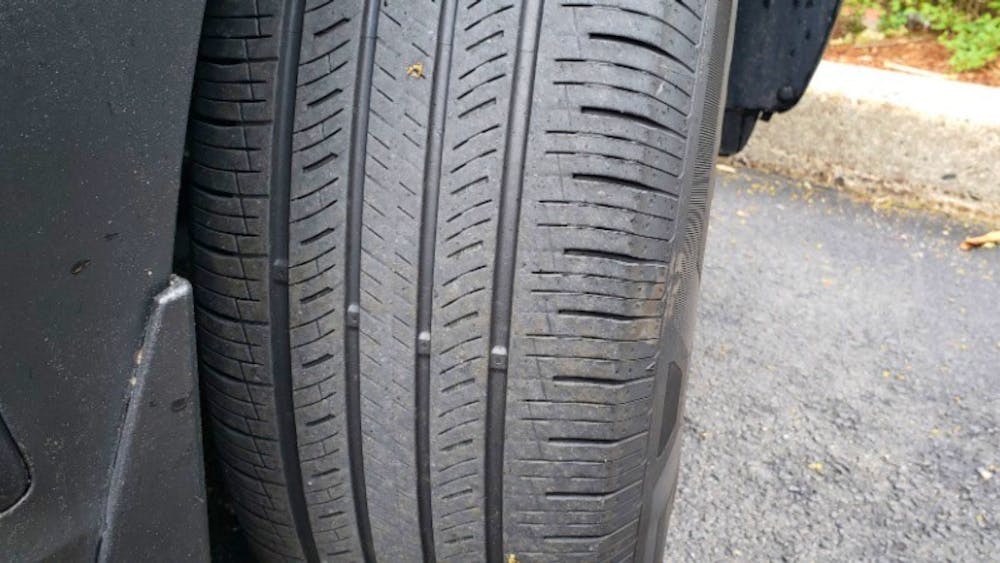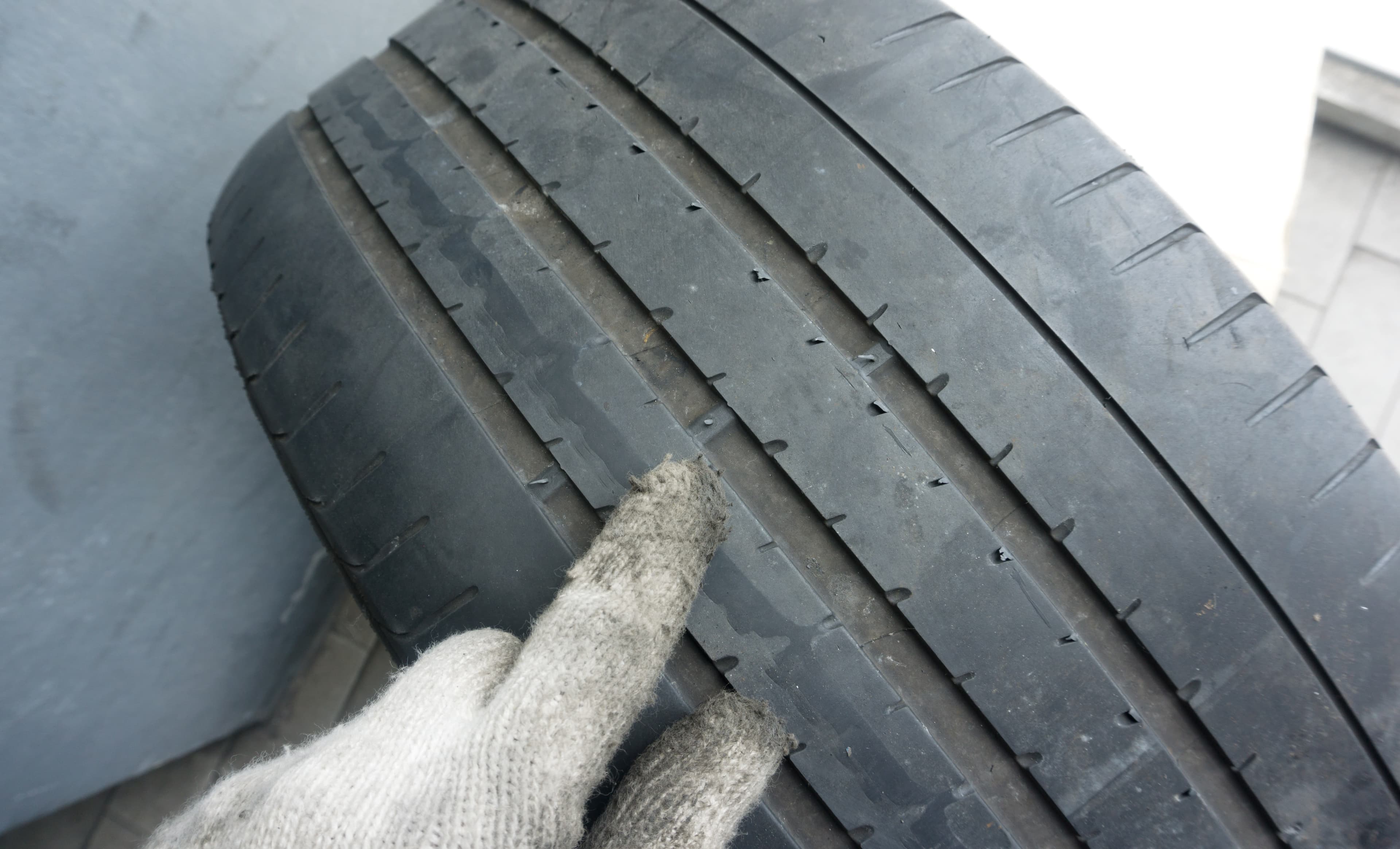Have you ever noticed your car pulling to one side or felt a rough ride? These might be signs of uneven tire wear, a common issue that can affect your safety and wallet.
Uneven tire wear doesn’t just shorten the life of your tires—it can also lead to costly repairs and dangerous driving conditions. If you want to keep your car running smoothly and avoid unexpected expenses, it’s crucial to recognize the warning signs early.
Keep reading to discover how to spot uneven tire wear and what you can do to fix it before it becomes a bigger problem.

Credit: www.michelin.ca
Common Patterns Of Uneven Tire Wear
Uneven tire wear can cause problems with driving and safety. Recognizing the patterns helps to fix issues early.
Different wear types show different problems with your tires or car alignment. Learn the common signs here.
Center Wear
Center wear happens when the middle of the tire tread wears faster than the edges. This often means the tires have too much air pressure.
Overinflated tires carry the load mainly on the center, causing quick wear in that area.
Edge Wear
Edge wear occurs when the tire edges wear faster than the center. This usually means the tire pressure is too low.
- Underinflated tires have more contact on the edges.
- Edges wear down faster from extra friction.
- Low pressure can cause poor fuel economy and handling.
Cupping And Scalloping
Cupping and scalloping look like high and low spots on the tire tread. These cause a bumpy ride and noise.
| Cause | Description |
| Worn suspension parts | Loose shocks or struts cause uneven tire contact. |
| Imbalanced tires | Weight imbalance makes tires bounce and wear unevenly. |
| Misalignment | Wrong angles cause tires to hit the road unevenly. |
Feathering
Feathering means the tread ribs feel smooth on one side and sharp on the other. This happens from misaligned wheels.
Signs of feathering include:
- Uneven tread edge wear on the tire ribs
- Scraping noise when driving
- Steering pull or vibration

Credit: www.cartalk.com
Causes Behind Uneven Tire Wear
Uneven tire wear happens when tires wear out in an irregular way. This can affect your car’s safety and performance.
Understanding the causes helps you fix problems early and avoid costly repairs.
Improper Wheel Alignment
Wheel alignment means setting the wheels at the right angles. Poor alignment causes tires to wear more on one side.
- Pulling to one side while driving
- Steering wheel not centered
- Rapid tire tread wear
Incorrect Tire Pressure
Tires need the right air pressure to work well. Too much or too little air causes uneven wear and damages tires.
| Tire Pressure | Effect on Tire Wear |
| Too High | Wears center of the tire more |
| Too Low | Wears edges of the tire more |
| Proper Pressure | Even wear across the tire |
Suspension Issues
Suspension parts keep your car steady. If they are damaged, tires can wear unevenly and cause bad handling.
Loose or worn suspension parts make tires hit the road at wrong angles.
Worn Out Components
Old or broken parts like shocks, bushings, and bearings affect tire wear. They reduce control and cause uneven pressure on tires.
Signs of worn components include:
- Strange noises from wheels
- Vibration while driving
- Uneven tire wear patterns
Visual Signs To Spot Early Wear
Checking your tires regularly helps you spot wear early. This keeps you safe and can save money on repairs.
Look closely at your tires for any unusual signs. Catching problems early can prevent bigger issues.
Bald Spots
Bald spots appear when parts of the tire lose tread completely. These areas look smooth and shiny compared to the rest.
They often happen from hard braking or skidding. Bald spots reduce traction and make driving unsafe.
Tread Depth Variations
Uneven tread depth means some parts of the tire have more wear than others. This can cause poor handling and poor grip.
| Symptom | Description |
| Shallow tread | Less depth than other areas, can cause slipping |
| Deep tread | Normal or less worn parts, better grip |
| Uneven wear | Different tread depths on the same tire |
Vibrations While Driving
Feel for shaking or vibration in the steering wheel or seat. This can mean your tires wear unevenly or are out of balance.
- Vibration at high speeds
- Shaking when braking
- Uneven movement on smooth roads
Noise Changes
Listen for new or louder noises from your tires. Uneven wear can cause humming or thumping sounds while driving.
Noise changes often mean tire tread is not uniform. This can reduce comfort and indicate damage.

Credit: simpletire.com
Preventing And Addressing Uneven Wear
Uneven tire wear reduces tire life and affects car safety. It happens when tires do not wear evenly across the surface.
Knowing how to prevent and fix uneven wear helps keep tires in good shape. This guide covers key ways to protect your tires.
Regular Tire Rotation
Tire rotation means moving tires from one position to another. This spreads wear evenly across all tires.
- Rotate tires every 5,000 to 7,000 miles
- Follow the pattern recommended by your car maker
- Check tires for damage during rotation
Maintaining Proper Inflation
Tires must have the right air pressure. Too low or too high pressure causes uneven wear and poor fuel use.
| Pressure Level | Effect on Tire Wear |
| Too Low | Wear on edges, less grip |
| Proper | Even wear, good performance |
| Too High | Wear in center, rough ride |
Timely Wheel Alignments
Wheel alignment adjusts tire angles to match car specs. Bad alignment leads to uneven wear and pulling to one side.
Signs you need alignment:
- Car pulls left or right
- Steering wheel is off center
- Tires show uneven wear
Routine Suspension Checks
Suspension parts affect tire contact with the road. Worn parts cause uneven wear and poor handling.
- Inspect shocks and struts regularly
- Look for broken springs or loose parts
- Fix issues quickly to protect tires
Frequently Asked Questions
What Causes Uneven Tire Wear On My Vehicle?
Uneven tire wear happens due to poor alignment, unbalanced tires, or wrong tire pressure.
How Can I Spot Signs Of Uneven Tire Wear?
Look for unusual tread patterns, bald spots, or one side wearing faster than the other.
Why Is Uneven Tire Wear Dangerous For Driving?
It reduces traction, causes poor handling, and may lead to tire failure or accidents.
How Often Should I Check My Tires For Uneven Wear?
Check your tires at least once a month and before long trips.
Can Uneven Tire Wear Be Fixed Without Replacing Tires?
Fixing alignment and balancing can help, but badly worn tires usually need replacement.
Conclusion
Uneven tire wear can cause safety risks and costly repairs. Watch for unusual tire patterns often and check tire pressure regularly. Rotate your tires to help them wear evenly. Keep your vehicle’s alignment and suspension in good shape. Catching problems early saves money and keeps you safe.
Drive smoothly and avoid rough roads when possible. Tires are your car’s only contact with the road. Taking care of them protects you and your vehicle. Stay alert to signs of uneven tire wear. Your safety depends on it.

